
There are many magnificent places to visit in Punakha which is a valley town in Bhutan's western region. In the past, it served as the capital of Bhutan for nearly 300 years, until 1955. After then it was relocated to Thimphu. Punakha's climate is mild in the winter and hot in the summer due to its lower elevation of about 1200 meters above sea level. During the winter season, villagers from higher altitudes in Bhutan flock to Punakha to escape the intense cold. Punakha is surrounded by two major rivers, the Mo Chhu and the Po Chhu, and as a result, it is one of Bhutan's most fertile towns. Red rice is grown in enormous quantities in Punakha's river valleys.
There some of the best places to visit in Punakha. The most prominent ones are as mentioned below.
The beautiful Punakha Dzong is one of the best places to visit in Punakha. At the confluence of two rivers, the Mo Chhu and Po Chhu, the Punakha dzong appears as a towering citadel of whitewashed stones. After reaching the dzong, the two rivers merge to form the Punakha Chhu River. The Punakha Dzong, which stood alongside a row of purple-blossomed jacaranda trees against a pure blue sky. It is surrounded by two glittering rivers which increase the beauty of the monastery even more. You can capture some Instagram-worthy photographs while standing in front of the monastery.
One of the best places to visit in Punakha is Chimi Lhakhang, a Buddhist monastery that stands beautifully on a gorgeous hillside. The monastery is said to have been built on a rock where a demon was defeated, according to mythology. Locals claim the monster was slain and trapped beneath the rock by a strange monk known as the "Mad Saint or Divine Madman." This sacred Buddhist temple was built in the year 1499 by Ngawang Choegyel, the fourteenth Drukpa hierarch. It has a unique square shape with a typical yellow roof, prayer wheels, and white slates on the exterior. Horns, bells, dorjis, thangkas, drums and other artifacts can be seen in the prayer hall of Chimi Lhakhang. In short, you will truly love to visit these religious sites.
Khamsum Yulley Namgyal Chorten, located on a ridge in the north Punakha Valley, is Bhutan's sole stupa honoring all forms of Dharmapala, the guardian deities. It is an excellent architectural and artistic example. Queen Mother Tshering Yangdon decided to construct a stupa in the 1990s to ward off evil spirits and maintain Bhutan's peace and kindness. To get there, you must hike for half a day through an iron suspension bridge, a rice field, and a curving road.
The suspension bridge built at the confluence of the Mo Chhu and Po Chhu rivers is one of the most famous sights for visitors visiting Punakha. It is one of the must-see attractions in Punakha. Walking across this 250-meter suspension bridge is exhilarating, but the views of the valley from the bridge are breathtaking.
Bhutan's Jigme Dorji National Park is the country's second largest. For a long time, the park has been on the list of potential World Heritage Sites, and it covers most of Gasa district, as well as adjacent districts, including Punakha. It has an extraordinarily diverse biodiversity. The average altitude of the park is ranging from 1400 to 7000 metres. For birdwatchers, this is one of the best sites to visit in Punakha. Crimson panda or a blue sheep are also sighted in the park along with Himalayan black bears, snow leopards, and Bengal tigers.
The Ritsha hamlet is known for its rice production, and it is here that both red and white rice are farmed in Bhutan. This village is located in Punakha on the banks of the Mo Chu and Pho Chu rivers. It is vastly popular for rice farming. Ritsha literally means "at the foot of the hill." The village is bordered by rivers, paddy fields, and mountains, making it one of Punakha's must-see destinations.
One of the best places to visit in Punakha is Dochula Pass at an elevation of 3100 metres above sea level. It is located at the route from Thimpu to Punakha. The pass is home to the 108 Druk Wangyal Chortens, which were built by Queen Mother Ashi Dorji Wangmo Wangchuk and offer breathtaking views of the valleys on both sides. Aside from the chortens, the Druk Wangyal Lakhang, which hosts the annual Dochula Druk Wangyel festival, is also located here.
Adventure enthusiasts will fall in love with Punakha as there are lots of activities they can do. Some of the most popular ones are as mentioned below:
One of the best things to do in Punakha is to walk through the Punakha Suspension Bridge. Suspension bridges are a common sight in Bhutan's valleys, which are characterised by mountainous terrain and swift rivers. If you don't hike to the Chimi Lakhang Temple, you'll come across the Punakha Suspension Bridge. It is built high above the rapid Pho Chhu. It is one of Bhutan's longest suspension bridges, measuring roughly 160-180 metres in length. Crossing it is one of the top things to do in Punakha.
Bhutan's native white and red rice are two of the most popular rices in Bhutan. These rice types are usually found in a secluded village called Ritsha in Punakha. Red rice is known for their distinct flavour, smell, and taste. This village is noted for its exquisite beauty and charm, as it is located along the gorgeous banks of the Po Chhu and Mo Chhu rivers. You can taste the Rec Rice here.
Rafting while tackling the rapids could be one of the most thrilling things to do in Punakha. White water rafting is a new delight for thrill seekers, and it's quickly becoming a cult among people who want to feel the rush of adrenaline. Adventurers swarm the location where the Po Chhu and Mo Chhu rivers meet to form the 'Devil's George' in Punakha Valley to quench their thirst.
Because it contains areas with elevations varying from 1400 to 7000 metres, the Jigme Dorji National Park is a hotspot for biodiversity. As a result, the reserve is home to some of the world's most endangered species. The varieties of birds that can be seen inside the reserve excite birdwatchers, and it is one of the best things to do in Punakha, Bhutan. Predators like as the Snow Leopard, Himalayan Bark Bear, Bengal Tiger, Indian Leopard, Ussuri Dhole, and others can be easily spotted here.
Shopping in Bhutan is a lot of fun. You can get beautiful stoles and woolens products in the markets all across the country. If you're looking for something to do in Punakha for shopping, the city centre is where you'll find all you need for your Bhutan trip. Local artisan work, including as statues, jewelry, and other odd home decor items, may also be found in abundance at Punakha shops.
Punakha can be visited at any time of the year. However, every season has their own kind of beauty to offer to the tourists.
April to June: Throughout the months of April to Jue, the town is ornamented with vibrant blossoming flowers. The weather is also pleasant during these months as it is the season of spring here. This is one of the best times to visit Punakha.
July to September: Throughout these months of July to September monsoon occurs rainfall and thunderstorm. The roads of the town get muddy as well as frequent landslides are reported. It is an ideal time to visit Punakha if you want to experience the lush greenary.
October to March: Throughout the months of October to March, winter dominates this town. The sky is clear and the view of the Himalayan peaks are quite alluring. Bringing warm clothes are recommended because of the low temperature.
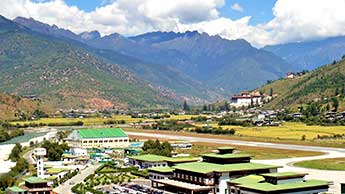
Paro is Bhutan's one of the most popular towns with many sacred sites and historical buildings.
View Details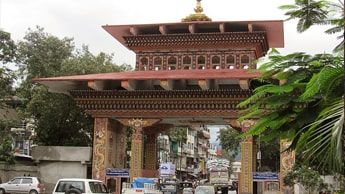
Phuentsholing is the border town in Bhutan with lots of popular places and attractions.
View Details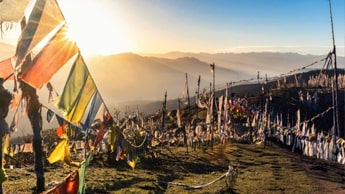
Chele La Pass is one of the highest motorable passes in Bhutan with breathtaking scenary of nature.
View Details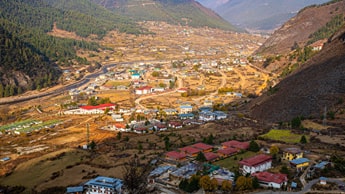
Haa Valley is tranquil yet popular north-south valley whose other name is Hidden Lande Rice Valley.
View Details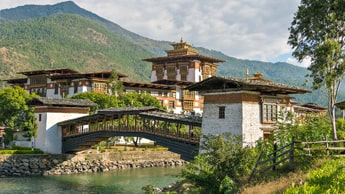
Punakha is a splendid town in Bhuatn's western region with lots of tourist attractions.
View Details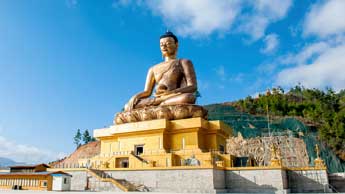
Thimphu is the capital town of Bhutan with countless tourist attractions you may explore.
View Details